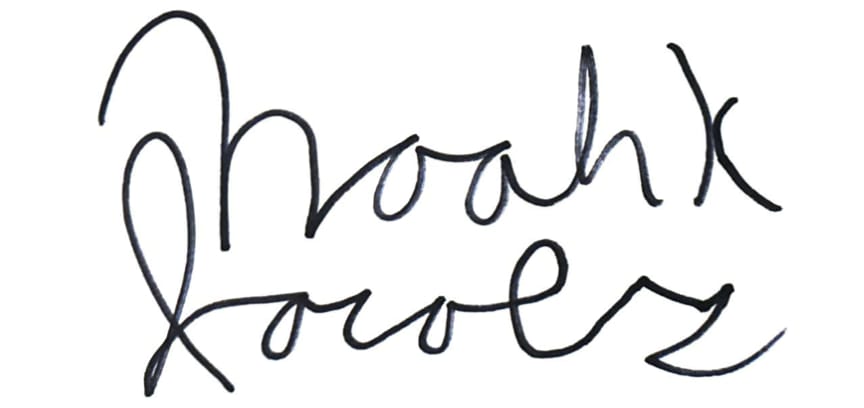- Noah Jacobs Blog
- Posts
- On Reduction
On Reduction
What you don't see is more important than what you do see.
2025.11.09
CXXV
[David Lies on the Ground; Silent Mornings; Hemingway & Mad Men; The Wizard Book; No Meetings, Please; Learning Through Negatives; Anti Heuristics; A Silent Night]
Thesis: What you don't see is more important than what you do so see.
[David Lies on the Ground]
What you don't see is more important than what you do so see.
Everything that makes Michelangelo's David beautiful was on the ground. It was the stone and dust and chips that fell away to leave only that which mattered--the perfect body of David himself.
This is true of almost everything in life.
Less is more.
Kill your darlings.
Show, don't tell.
Delete ruthlessly.
Truth & Beauty will be all that remain.
[Silent Mornings]
Silent Mornings are one of my favorite things in the world.
I don't just mean silent as in the absence of audible noise. I mean silent in the absence of any sort of noise.
I wake up to my casio wrist watch vibrating. I silence the backup alarm on my phone before it goes off. When I do, my phone is on do not disturb, so I don't see any notifications.
This is critical. The moment I start looking at my phone, my brain starts saying yes to everyone and every algorithm that is asking for my attention.
Instead, I stay in bed and stretch for 10 minutes.
Then, I spend 10-15 minutes in the bathroom.
I go up stairs, start the coffee pot.
I walk a couple of blocks outside before coming back to our co working space to get started with the day.
I have at least 30 minutes of real silence. No notifications, nothing to react to.
I solve a lot of problems during this time. Yesterday, as an example, this is when a simple solve to a low frequency but high impact error I had been dealing with came to me.
30 minutes of me saying no to everything except for what I decide to say yes to.
[Hemingway & Mad Men]
Hemingway is one of my favorite authors.
What was most shocking to me when I started reading him was how sparse his prose was.
I remember long bouts of dialogue, sometimes with no tagging of who was speaking.
I was stunned by how beautiful it was.
By removing so much fat, the motivations of each character, and the complex dynamics between them were laid bare.
If you are looking to see this first hand, I would recommend The Sun Also Rises. It is not just one of my favorite Hemingway novels, but one of my favorite novels of all time.
The brilliance of Mad Men mirrors Hemingway’s own artfulness.
Perhaps Peggy is being pushed around by Don & ignored by Roger (her bosses) in a couple of scenes; then, a few scenes later, she cruelly snaps at one of her subordinates.
She doesn't then say, "Sorry, I was angry because Don was bullying me." A narrator doesn’t say that either. Maybe her character doesn't even realize that this is why she snapped.
But you, as the viewer, if you are paying attention, notice this. And maybe, you don't judge her so harshly for being mean, and even have more sympathy for her when you see that' she’s struggling to justify to herself why she just did that.
It's more beautiful because you see it and feel it rather than having it explicitly stated.
The human condition, laid bare.
[The Wizard Book]
Beautiful code is like this, too.
It is sparse, there is little line noise. It does something meaningful with as few characters as possible.
“The Wizard Book”, formally called Structure and Interpretation of Computer Programs*, really helped me understand this. It shows you how to build a system from the ground up that is designed to do more with less.
When coding, reduction is not just useful when you are designing your whole system; it is also useful on a micro level, too.
Take these two pieces of python code:
filtered_names = []
for account in accounts:
if "a" in account.get("name"):
filtered_names.append(account.get("name"))filtered_names = [n for a in accounts if "a" in (n := a.get("name"))]Both extract names that contain the letter a from a list of objects.
The second one does it in three fewer lines, half as many characters, and will run faster & use less memory.
Rarely are trade offs in life this obvious and beautiful.
The problem isn't that any reasonable person, given the facts, would prefer the first version. The problem is that most reasonable people, especially if they use LLMs to code for them, won't even know that the second version is an option.
Granted, there is an argument that the second version is “less readable,” which is an issue I am isolated from as a solo dev. That being said, things are “less readable” when you don’t see them often.
*You must read the first or second edition. I have not read the third edition, but it is written for JavaScript, which is strange, because the first two editions are so mind bending precisely because they use Lisp, a language that makes many complex things that are exceedingly difficult to do in JavaScript or Python easy.
[No Meetings, Please]
It's hard to understand how positive of an impact not having to build slide decks or fundraise or have meetings with investors or thorough status updates really has on a business.
You only have so much time in the day--what's going to have the highest return on your time?
As we build BirdDog, it seems to Jack & I that the answer is almost always making the product better, a customer happy, or adding a new client.
There are a lot of things we simply don't do that we would probably want to do if we were a bigger org or had more stakeholders.
So far, by not having those things, we've been able to maintain some of a startups chief advantages, speed and nimbleness, to a higher degree than should be possible so far.
Of course, there are clear and obvious trade offs; we're certainly not scaling as fast as we otherwise could.
That's okay, though, because we're not yet ready to make those trade offs.
[Learning Through Negatives]
The fact that it’s much harder to see what’s not there than what is there may be part of the reason that mastery is so hard.
You can see a beautiful and simple finished product like an original iPhone, and you immediately have a feel for how good it is.
It’s a lot harder to see the iPhone and build something that good yourself, though.
Until you try and build things and fail because you invest too much time in parts that don’t matter, it’s hard to have any sort of intuitive feel for which parts really will matter.
When we try to learn, it’s a lot easier to see things that people have done and try to copy those. But, at the end of the day, the more you do things you shouldn’t do and deeply understand why you shouldn’t do them, the more quickly you’ll be able to hone in on the parts that actually matter.
[Anti Heuristics]
For me, it’s far easier to give myself absolute rules around what to say no to than it is to negotiate with myself on everything every day.
There is a lot you have to cut to be left with beauty, and much of it is not obvious. The good news is that you probably already know a couple of things that you can completely remove that will take you leaps and bounds from where you are.
If you enjoyed this post, please give my blog a subscribe—I’m here every weekend with more on becoming the person you know you must become.
[A Silent Night]
The last thing I see before I go to sleep is not my phone.
It is my journal, where I reflect on the day.
It doesn't have a touch screen or access to the internet or the ability to contact others.
That's okay, because I'm saying no to all of that as I'm preparing for sleep.
Just as is the case with everything else, that no matters a lot.
It means that the only thing left to say yes to is silence and myself and my thoughts.
Ink leaves the pen to stain the page and keep me stable and steady and focused on whatever I decide matters.
Live Deeply,

